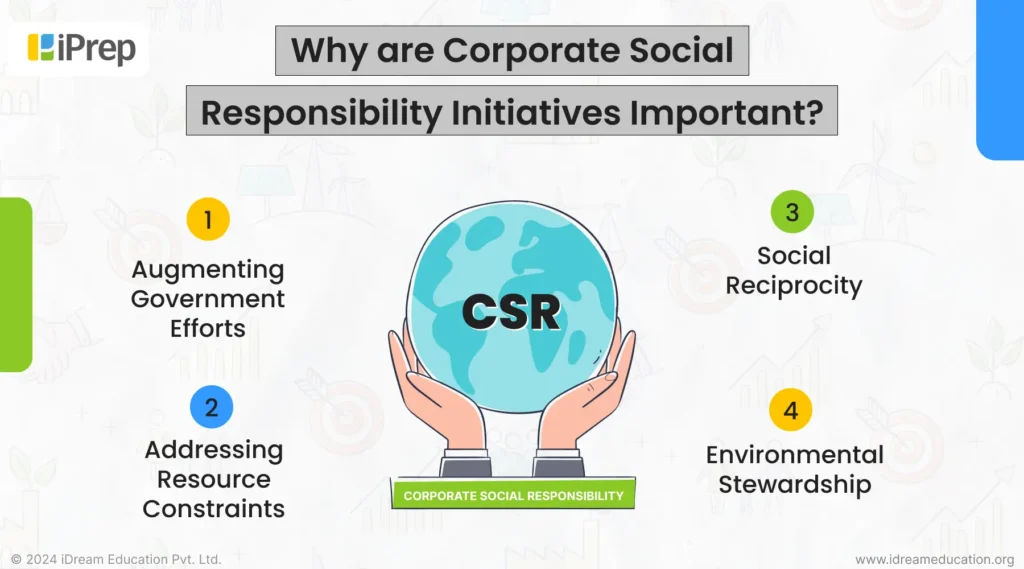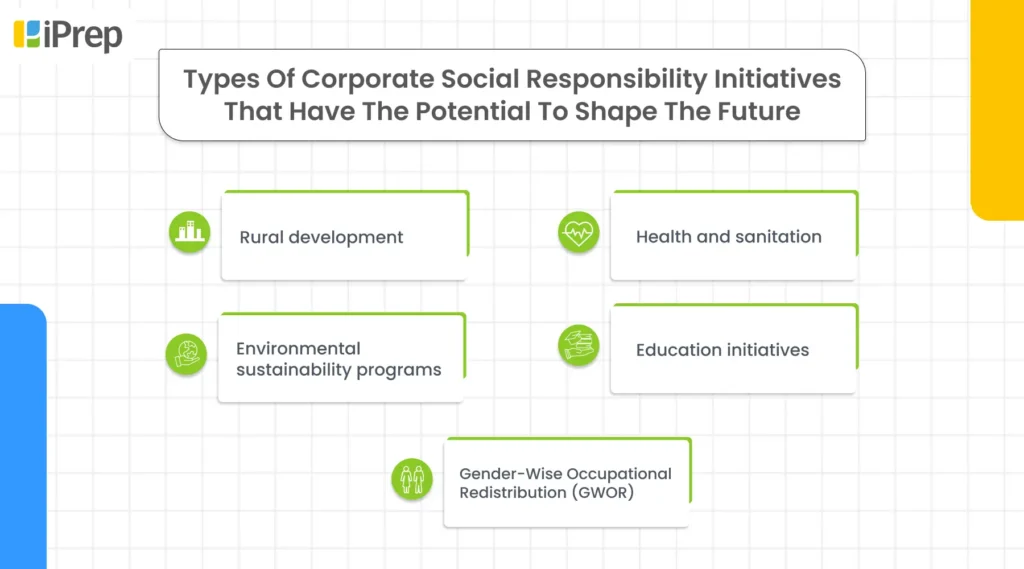Corporate Social Responsibility Initiatives Shaping The Future Of India

In India, corporate entities meeting specific criteria, such as a net worth exceeding Rs. 500 crore, turnover surpassing Rs. 1000 crore, and net profit exceeding Rs. 5 crore, are mandated to allocate 2% of their average net profit from the previous three years or more to social responsibility initiatives. Notably, this regulatory framework underscores the evolving landscape of Corporate Social Responsibility initiatives, which have become integral to global corporate culture.
The increasing commitment of Indian businesses to Corporate Social Responsibility Initiatives reflects the heightened awareness of its pivotal role in contributing to societal well-being. This blog explores the profound significance of Corporate Social Responsibility Initiatives in the Indian corporate sector, highlighting their diverse focus areas and the potential impact they hold for the nation’s future.
Let’s first examine what Corporate Social Responsibility Initiatives are.
What are Corporate Social Responsibility Initiatives?
Corporate Social Responsibility (CSR) refers to a business practice that involves companies taking responsibility for their impact on society beyond their primary goal of maximizing profits. Corporate Social Responsibility Initiatives are specific actions and programs that companies undertake as part of their CSR strategy. These initiatives are designed to address and mitigate the company’s impact on various stakeholders, including employees, customers, communities, and the environment.
Corporate Social Responsibility initiatives go beyond legal compliance and aim to make a positive difference in areas such as social welfare, environmental sustainability, and ethical business practices. Additionally, these initiatives are crucial for fostering a sense of corporate responsibility. Furthermore, they contribute to the broader goal of sustainable development and, consequently, are essential for businesses striving to align with evolving societal expectations. Moreover, as businesses increasingly recognize the interconnectedness of their operations with social and environmental concerns, these initiatives play a pivotal role in shaping a more responsible and sustainable corporate landscape.
Key components of Corporate Social Responsibility Initiatives
Environmental Sustainability:
Businesses must embrace eco-friendly procedures, encourage energy efficiency, and lessen their carbon impact. This can entail establishing sustainable & environment-friendly supply chain methods, cutting waste, and employing renewable energy sources.
Social Welfare:
Corporate Social Responsibility Initiatives frequently centre on helping the community in which they operate by partnering with nonprofits, making charitable contributions, and carrying out community development projects. This can involve providing financing for projects aimed at reducing poverty, healthcare efforts, and educational activities.
Employee Well-being:
Programs that improve employees’ well-being, such as employee volunteer programs, diversity and inclusion initiatives, and health and wellness programs, can be included in corporate social responsibility initiatives.
Stakeholder Engagement:
Businesses interact with stakeholders to learn about their issues and incorporate their inputs into their CSR initiatives. This ensures that the programs resonate with the needs of the stakeholders, addressing the issues that are most important to them.
By emphasizing these Corporate Social Responsibility initiatives, companies can contribute to a more sustainable and responsible business environment, demonstrating a commitment to social and environmental concerns beyond the pursuit of financial gains.
Let’s now look at the significance of Corporate Social Responsibility Initiatives.
Why are Corporate Social Responsibility Initiatives Important?

Corporate Social Responsibility initiatives play a crucial role in addressing societal and environmental challenges, offering several compelling reasons for their importance:
Augmenting Government Efforts:
The sheer size of India’s population presents a daunting challenge for the government to meet all the diverse needs and address various issues comprehensively. Corporate Social Responsibility initiatives act as valuable supplements to government efforts. Moreover, By actively participating in social and environmental causes, companies can efficiently contribute to initiatives such as education, healthcare, and poverty alleviation, thereby alleviating the burden on the government and synergizing with the Government for greater impact.
Addressing Resource Constraints:
With limited government resources, Corporate Social Responsibility initiatives become instrumental in mobilizing additional funds and resources to tackle pressing issues. Through their Corporate Social Responsibility initiatives, companies can bridge gaps in essential services and infrastructure, fostering sustainable development in areas where resources may be scarce.
Social Reciprocity:
Corporate Social Responsibility initiatives embody a sense of social reciprocity. Companies derive their success and profitability from the society in which they operate. By giving back through Corporate Social Responsibility initiatives, businesses acknowledge their indebtedness to the community. It is a way of returning the financial gains earned from customers, expressing a commitment to the well-being of the very people who contribute to the company’s prosperity.
Innovation
Corporate Social Responsibility initiatives help breed & foster innovation. Innovative practices and breakthroughs of various Corporate Social Responsibility initiatives have led to significant impact while also creating replicable and scalable models for the future and for others to adopt, leading to a much wider impact than the initiative itself. This is possible due to the focus these initiatives bring due to the involvement of expertise, resources and skills that are unique to these different organizations. Often, it is seen that organizations leverage their R&D, product/products, reach, networks, customers, and stakeholders in positively carving out great social outcomes. Shared value partnerships, gift-in-kind, and product integrations are just some examples of innovative CSR practices.
Environmental Stewardship:
Many large manufacturing companies contribute to environmental challenges through carbon emissions and other ecological impacts. Corporate Social Responsibility initiatives, in such cases, involve proactive steps to mitigate these negative effects. Companies are increasingly recognizing their environmental responsibilities and are implementing initiatives to reduce carbon footprints, conserve resources, and promote sustainable practices.
In short, Corporate Social Responsibility initiatives are crucial for several reasons. They complement government initiatives in a country with a large population, address resource constraints, foster social reciprocity by returning profits to the community, and tackle environmental challenges created by business operations. As companies actively engage in Corporate Social Responsibility initiatives, they contribute not only to their own sustainability but also to the broader well-being of society and the environment.
Creating Jobs and Community Mobilization & Behavior Change
Many Corporate Social Responsibility initiatives have been found to create jobs within communities or at large. These jobs are also sustainable and bring long-term livelihood in the targeted communities, initiating a chain reaction that eventually leads to better education, healthcare, and infrastructure in these communities, helping them break the intergenerational chain of poverty and social stereotypes, influencing behaviour change, and improving social equity.
Now, let’s look at how CSR Initiatives are shaping the future of India in the next section.
How Are Corporate Social Responsibility Initiatives Shaping The Future Of India?
The allocation of substantial financial resources towards Corporate Social Responsibility initiatives in recent fiscal years underscores the potential impact these initiatives can have on shaping the future. According to the National CSR Portal and Ministry of Corporate Affairs in the financial year 2021-22, an expenditure of INR 25,932.79 crore was reported. Additionally, following INR 26,210.95 crore in the preceding fiscal year 2020-21, there is a consistent commitment to these initiatives. Notably, a substantial portion, INR 5,831.26 crore, was directed towards educational initiatives during the fiscal year 2020-21. In the fiscal year 2019-20, INR 24,965.82 crore was spent, showcasing a continuous upward trend. Furthermore, in the year 2018-19, an expenditure of INR 20,217.65 crore was recorded, indicating a gradual but significant increase in corporate social responsibility contributions over the years. Moreover, this trend is indicative of a growing awareness among corporations regarding their role in societal well-being.
These significant financial allocations signify a commitment to Corporate Social Responsibility initiatives, with a focus on fostering positive societal change. The notable expenditure in the education sector, among others, underscores a strategic investment in initiatives that directly impact the future. Education, skills development, rural development, community development, and environmental sustainability initiatives have emerged as key focal points for CSR investments.
CSR initiatives can’t overstate the potential transformative impact on the future. Educational initiatives, when adequately funded, contribute to the development of a skilled workforce, thereby influencing the socio-economic landscape. Similarly, investments in skills development not only enhance employability but also contribute to the overall progress of the nation. Furthermore, rural development initiatives, including infrastructure projects, hold the promise of bridging urban-rural disparities and fostering inclusive growth. Additionally, by addressing these aspects of social responsibility, corporations play a pivotal role in shaping a sustainable and equitable future.
Furthermore
Community development initiatives and environmental sustainability projects are critical components of CSR that, if prioritized today, can yield long-term benefits for society. Ethical business practices and responsible sourcing are integral to CSR, fostering a sustainable and ethical business environment.
The potential for shaping the future lies in the efficacy and impact of CSR initiatives. Consequently, design these initiatives with a focus on measurable outcomes and demonstrable effectiveness. By strategically directing CSR investments into initiatives that address pressing societal needs and challenges, corporations have the opportunity to contribute significantly to the betterment of society and shape a more sustainable and equitable future.
Types Of Corporate Social Responsibility Initiatives That Have The Potential To Shape The Future

CSR initiatives play a crucial role in shaping a more sustainable and socially responsible future. Various types of CSR initiatives have the potential to make a significant impact on society and the environment.
Rural development
CSR initiatives focused on rural development aim to uplift and improve the quality of life in rural areas. Companies can contribute to this cause by investing in infrastructure development, promoting sustainable agricultural practices, and supporting local entrepreneurship. This can include building roads, providing access to clean water, and facilitating skill development programs for the rural population. By empowering rural communities, businesses not only contribute to societal development but also create potential markets for their products and services. Furthermore, these efforts align with broader sustainable development goals.
According to the Ministry of Corporate Affairs In the financial year 2021-22, a noteworthy commitment was made to this cause, as evidenced by a total expenditure of 1801.43 Crore INR. This substantial investment highlights the corporate sector’s dedication to fostering positive change in rural areas, showcasing the potential impact of CSR initiatives on shaping the future. Moreover, such financial commitments not only demonstrate social responsibility but also deepen the significance of collaborative efforts between businesses and communities to drive sustainable development.
Health and sanitation
Health and sanitation initiatives are crucial for ensuring the well-being of communities. Companies can engage in CSR activities that focus on improving healthcare infrastructure, conducting health awareness programs, and supporting sanitation projects. This may involve building healthcare facilities, providing medical equipment, and organizing health camps. Additionally, promoting hygiene and sanitation practices helps prevent the spread of diseases, contributing to the overall health and productivity of the community.
In the financial year 2021-22, a notable investment of 7937.66 Crores was dedicated to health and sanitation initiatives. This substantial expenditure reflects a commitment to making a positive impact on public health and emphasizes the corporate responsibility towards community well-being. Such significant financial contributions demonstrate the potential for corporate social responsibility to shape the future by addressing critical issues and fostering sustainable development.
Gender-Wise Occupational Redistribution (GWOR):
GWOR initiatives aim to address gender disparities in the workplace. Companies can promote diversity and inclusion by implementing policies that ensure equal opportunities for all genders. Additionally, this may include initiatives to recruit, retain, and promote women in leadership positions, as well as creating a workplace culture that values and supports diversity. By fostering a gender-inclusive environment, businesses contribute to a fair and balanced society while harnessing the full potential of their workforce. Transitioning to the financial aspect, according to the National CSR Portal, in the financial year 2021-22, the total expenditure for GWOR initiatives amounted to 707.18 Cr. Furthermore, this showcases the commitment of the companies to creating a more equitable and inclusive workplace.
Environmental sustainability programs
With increasing awareness of climate change and environmental issues, businesses are increasingly adopting CSR initiatives focused on sustainability. These programs may involve reducing carbon emissions, implementing energy-efficient practices, and supporting conservation efforts. Additionally, companies can also invest in eco-friendly technologies, promote recycling, and participate in reforestation projects. By prioritizing environmental sustainability, businesses play a crucial role in mitigating the impact of climate change and preserving natural resources for future generations. Moreover, in the financial year 2021-22, a total expenditure of 2366.15 was dedicated to these initiatives.
Education initiatives
Education initiatives play a crucial role in CSR as they possess the potential to shape the future. Additionally, companies can create a lasting impact by supporting educational institutions through diverse channels, encompassing the provision of resources, scholarships, and mentorship programs. Furthermore, embracing technology-driven educational initiatives, such as online learning platforms, adds another layer to their commitment. Moreover, the integration of these innovative approaches not only enhances educational accessibility but also aligns with the evolving demands of the digital era.
In the financial year 2021-22, dedicated investment in education initiatives amounted to 6549.15, underscoring steadfast commitment to contributing to societal development through education.
iDream Education has played a crucial role in facilitating such education initiatives. Our strategic partnerships with CSR leaders like Cipla and Samsung have proven instrumental in elevating these initiatives.
Moreover, by collaborating with these companies, we successfully implemented our solutions iPrep Digital Class, iPrep Digital Library, and iPrep Tablets. Notably, we placed a strong emphasis on the enhancement of students’ employability as a strategic approach to breaking the poverty chain. Additionally, our focus on employability aligns with broader goals of fostering sustainable development and economic empowerment.
Through collaborative efforts with Cipla and Samsung, our focus extended beyond mere implementation to delivering demonstrable outcomes. This has proven crucial in showcasing the efficacy of our initiatives.
Additionally, our support extended to aiding these companies in effectively presenting their impact assessments, whether to the government or other relevant stakeholders. This comprehensive approach ensures transparency and accountability in our CSR endeavours. Consequently, it ultimately amplifies the positive effects of educational initiatives.
Let’s Conclude
In conclusion, the increasing commitment of Indian corporations to CSR initiatives reflects a transformative shift in their role toward societal well-being. Moreover, the mandated allocation of profits towards CSR, along with substantial financial commitments, enhances the pivotal role of these initiatives in shaping India’s future. Notwithstanding these advancements, it is crucial to recognize that the journey towards corporate social responsibility is ongoing; consequently, further efforts are imperative to ensure sustained positive impact.
CSR initiatives, spanning diverse areas like rural development, health, gender equality, environment, and education, serve as powerful instruments for positive change. The investments made in recent fiscal years demonstrate a genuine dedication to addressing societal issues and fostering sustainable development.
Through strategic and collaborative CSR, businesses are actively shaping a future marked by social progress, environmental sustainability, and inclusive growth in India.
Frequently Asked Questions -
1. What is the future of corporate social responsibility in India?
The future of CSR in India is shaped by three key trends: tech-driven sustainable solutions, collaborative efforts with NGOs and communities, and strategic alignment with core business operations. These insights are drawn from the 2023 FICCI report, emphasizing the need for a strategic CSR approach for inclusive and sustainable development.
2. Why is corporate social responsibility important in India?
India faces extensive social and environmental challenges that require proactive solutions. Corporate Social Responsibility plays a crucial role in bridging gaps in education, healthcare, and sustainability. It fosters inclusive growth, builds brand trust, and attracts skilled talent, ultimately benefiting both society and businesses.
3. What is the impact of CSR on the Indian economy?
Corporate Social Responsibility positively impacts the Indian economy through community development, job creation, and fostering a skilled workforce. By investing in education and healthcare, CSR enhances human capital, contributing to long-term economic growth. Moreover, environmental sustainability initiatives ensure resource preservation, benefiting both businesses and the nation's economic interests.
4. What are the types of CSR in India?
CSR initiatives in India encompass a broad spectrum, addressing pivotal areas such as education, healthcare, poverty alleviation, environmental sustainability, skill development, and gender equality. From building schools and healthcare facilities to promoting renewable energy and supporting women's empowerment, these multifaceted initiatives contribute significantly to fostering a positive societal and environmental impact.
5. What is the CSR initiative in India?
A CSR initiative in India refers to a company's voluntary activities addressing social and environmental issues, aligned with the principles outlined in Schedule VII of the Companies Act, 2013.
6. Which companies are required to undertake CSR activities in India?
Companies with a net worth of INR 500 crore or more, a turnover of INR 1,000 crore or more, or a net profit of INR 5 crore or more during the financial year are required to spend on CSR activities.
7. How much should a company spend on CSR activities?
As per the Companies Act in India, companies must allocate a minimum of 2% of their average net profits over the three immediately preceding financial years for Corporate Social Responsibility (CSR) activities. It is crucial to highlight that this requirement represents a baseline, and companies are urged to allocate additional funds if possible. This alignment with their commitment to social and environmental responsibility provides flexibility, enabling companies to amplify their impact and make substantial contributions to the communities and causes they support.
8. What are the future trends in Corporate Social Responsibility spending in India?
Predictions indicate a continued increase in spending on Corporate Social Responsibility (CSR) in India as companies recognize the growing importance of social and environmental responsibility. According to the 2023 Grant Thornton report, a 30% increase is expected, projecting CSR spending in India to surpass INR 25,000 crore by 2025. Future trends point towards a shift to innovative technology-driven solutions, alignment with UN Sustainable Development Goals, and partnerships for greater impact and inclusivity. India's CSR landscape is transforming into a strategic driver of positive change, promising a more sustainable and equitable society.
9. What are the emerging areas for CSR initiatives in the future?
Future CSR initiatives focus on digital literacy, renewable energy, and climate change, aligning with UN SDGs. A 2023 UNESCO report notes that 47% of the global population lacks digital skills. IPCC warns of consequences beyond 1.5°C, urging renewable energy investments. The 2023 Global Sustainable Development Report highlights stalled SDG progress. In India, IAMAI reports that 45% of the population lacks internet access, emphasizing the need for tailored initiatives. CSR addresses global challenges, benefits society, enhances corporate reputation and contributes to long-term value.
10. How is CSR spending expected to evolve in India in the coming years?
Corporate Social Responsibility (CSR) spending in India is projected to experience significant growth in the coming years, fueled by an evolving corporate landscape and a rising focus on environmental, social, and governance (ESG) factors. Data from a 2023 report by Grant Thornton estimates that India's CSR spending will surpass INR 25,000 crore by 2025, representing a 30% increase from 2022. This upward trend reflects growing corporate profits, a stronger commitment to responsible practices, and the increasing influence of ESG principles among investors and consumers.
11. In which sectors is the most significant growth in CSR spending anticipated?
Future CSR spending is expected to notably increase in sectors related to climate action, education, renewable energy, and technology-driven solutions. A recent report by GlobalGiving forecasts that CSR spending in the clean energy sector alone will reach $150 billion by 2025, marking a 50% increase from 2023. This data, combined with India-specific insights from reports like CEEW and Grant Thornton India, underscores the rising importance of climate action and sustainable development, emphasizing substantial investment potential in these areas.






